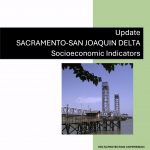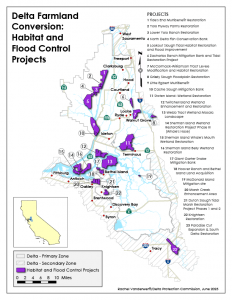 WEST SACRAMENTO, Calif. (June 24, 2025) – The Delta Protection Commission invites public comment through Sept. 8, 2025, on the preliminary report of its study of Delta farmland conversions for water supply, flood control, and habitat projects.
WEST SACRAMENTO, Calif. (June 24, 2025) – The Delta Protection Commission invites public comment through Sept. 8, 2025, on the preliminary report of its study of Delta farmland conversions for water supply, flood control, and habitat projects.
Preliminary results of the study (PDF) were presented at public workshops held July 15 and 17, and to the Delta Protection Commission at its regular meeting on July 17. Several speakers highlighted their concern about the impact of the aggregate loss of farmland in the Delta. Agriculture drives the Delta’s economy, and protecting its critical mass is part of the Delta Protection Commission’s mandate.
The research is ongoing, but the Commission is seeking feedback to guide its continuing study. All feedback is welcome, but the DPC is particularly interested in:
- For Delta farmers, reclamation districts, and other landowners, what impacts are they experiencing when farmland is converted?
- Are the processes leading up to the conversions adequate in terms of consultation with adjacent landowners and mitigation of negative impacts?
- Are options to maintain farmland in ways that support ecosystem goals being given adequate consideration?
- Project areas shown on maps in the preliminary report include some acreage that remains as farmland and needs to be subtracted from conversion totals before the research is finalized. Beyond this, is the acreage of completed and planned conversions in the preliminary report accurate and complete?
Comments on the preliminary study may be submitted by email to submit@delta.ca.gov. The deadline is 5 p.m. Monday Sept. 8, 2025.
Wednesday, July 23, 2025, 1:30-2:30 p.m. (end time is approximate)
2101 Stone Blvd, Suite 200
West Sacramento, CA 95691
Pursuant to Government Code section 11123.5, members of the Committee will participate remotely in this meeting. The public will have the same level of remote access.
Password: 699069
Meeting URL: https://us06web.zoom.us/j/89423484620?pwd=AUbfopkGSohxvkbKgbXj8A82b66vwk.1
Join by Telephone
Dial: USA 404 443 6397
USA 877 336 1831 (US Toll Free)
Conference code: 473786
Questions, Comments, and Requests
If you have any questions or have a request for reasonable modification or accommodation due to a disability, please contact the Delta Protection Commission at dpc@delta.ca.gov or (916) 375-4800. Attachments and additional information can be found on the Delta Protection Commission website: delta.ca.gov.
Executive Director Selection Ad Hoc Committee Members
Diane Burgis, DPC Chair, Contra Costa County Board of Supervisors | Oscar Villegas, Yolo County Board of Supervisors | Patrick Hume, Sacramento County Board of Supervisors | Tom Slater, North Delta Reclamation Districts | Gloria Sandoval, CA Natural Resources Agency
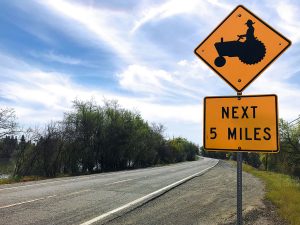 WEST SACRAMENTO, Calif. (June 17, 2025) – The Delta Protection Commission has scheduled public workshops on July 15 and 17 to hear about the impacts of farmland conversion for habitat and flood control projects on farmers, reclamation districts, and other affected parties.
WEST SACRAMENTO, Calif. (June 17, 2025) – The Delta Protection Commission has scheduled public workshops on July 15 and 17 to hear about the impacts of farmland conversion for habitat and flood control projects on farmers, reclamation districts, and other affected parties.
Sign Up Here
Agriculture is a cornerstone of the Delta economy, and changes to farmland use can create challenges for those who rely on it.
Preliminary research by Delta Protection Commission staff suggests that more Delta farmland is being converted for habitat and flood management projects than for urban development. Additional conversions are planned. UPDATE: The preliminary results of our study are now available (PDF).
The Delta Protection Commission is preparing a report to better understand the scale and impacts of these changes, and to offer practical, achievable recommendations to prevent negative impacts.
Input from these workshops will be included in the final report, “Delta Farmland Conversions: Water Supply, Flood Control, and Habitat Projects,” which is expected to be presented to the Delta Protection Commission in September.
Workshop dates, times and locations are:
Following the second workshop, the Delta Protection Commission will hold its regular meeting at 5 p.m. at the same location as the workshop: The Point Restaurant. At that meeting, staff will share a summary of input received at the workshops.
Sign Up
To attend, please use the sign-up form below to ensure adequate seating is available at each workshop.

DPC Chair Diane Burgis
WEST SACRAMENTO, Calif. (June 6, 2025) – The Delta Protection Commission is seeking a new Executive Director to guide protection and enhancement of the Sacramento-San Joaquin Delta region.
The DPC is one of three Delta-focused state agencies, and the only one overseen by an independent Commission composed mainly of elected representatives of Delta counties, cities, and reclamation districts.
“The Delta is rich in natural resources, agricultural production, history, and diverse communities and cultures. But it’s also a fragile place that needs our protection and support,” said Commission Chair Diane Burgis, who is a Contra Costa County supervisor.
“We’re looking for someone who can navigate the complexities of working with a variety of local, state, and federal agencies while providing strong vision, leadership, and direction for a staff of eight,” Burgis said.
More details, including key attributes of an ideal candidate, are available here.
What the DPC Does
The functions of the DPC include:
Land Use: Protecting legacy communities and the agricultural nature of the Delta by ensuring a variety of land-use decisions in the Primary Zone (PDF) conform with the Land Use and Resource Management Plan (PDF). The state Legislature has given the Commission authority to appeal these decisions, and hear appeals brought by others.
National Heritage Area: Promoting the Delta’s historic and cultural riches as the agency designated by Congress to coordinate the Sacramento-San Joaquin Delta National Heritage Area. The Delta is the first and only NHA in California. NHAs are supported by the National Park Service, but locally run and non-regulatory.
Great California Delta Trail: Fostering healthy connections to and through the Delta as the agency designated by the Legislature to coordinate the Great California Delta Trail. More than a single trail, the GCDT is envisioned as a network of land and water trails that will connect the San Francisco Bay Area to Sacramento.
Other DPC efforts include advocating for funding for levee maintenance and repairs, economic sustainability, community planning, and promoting the Delta as a place worthy of recognition, respect, and protection.
It also advocates for Delta interests with regard to the proposed Delta Conveyance Project.
Applying
To be considered for this exceptional career opportunity, immediately submit your resume, cover letter, and a list of six work-related references (two supervisors, two direct reports, and two colleagues, who will not be contacted until final stages and only with prior permission of the candidate). Resume should reflect years and months of employment, beginning/ending dates, as well as size of staff and budgets you have managed.
Resume review will begin the morning of Monday, July 7, 2025.
Please submit your application here.
OAKLEY, Calif. (May 15, 2025) – The Delta Protection Commission appointed two new members and re-appointed three incumbents to the Delta Protection Advisory Committee (DPAC) on Thursday.
The new appointees are Jerred Dixon for the Delta Conservation/Habitat NGO seat and Jeffrey Twitchell to the Delta Flood Entity seat.
Dixon is the director of Staten Island, a Nature Conservancy farm managed for wildlife-friendly agriculture. He is a graduate of the Delta Leadership Program.
Twitchell is a flood protection engineering consultant and advisor to eight Delta Legacy Communities.
The incumbents who were reappointed Thursday are:
- Arron Pellarin, Delta Business (Seat 1)
- Anna Swenson, Delta General Public (Seat 1)
- Russell Ryan, Delta Water Exporter
All five will serve three-year terms.
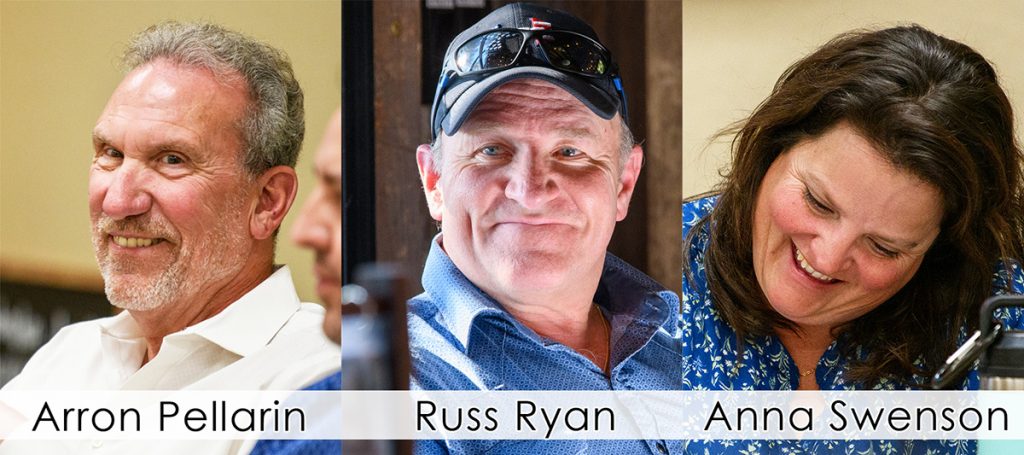
L-R: Arron Pellarin, Russ Ryan, Anna Swenson
DPAC provides recommendations to the Delta Protection Commission on diverse interests within the Delta, including the Delta’s socioeconomic sustainability, recreation, agriculture, flood control, environment, utility infrastructure, and other Delta issues. The Committee was created by the Delta Protection Act, Public Resources Code Section 29753(a).
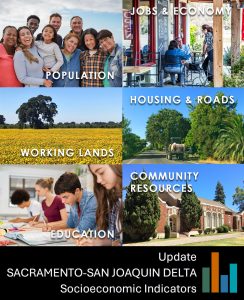 WEST SACRAMENTO, Calif. (March 21, 2025) – Unemployment fell. Median income rose. Land in agricultural production increased. These improving socioeconomic indicators for the Sacramento-San Joaquin Delta are highlights of a report released today by the Delta Protection Commission.
WEST SACRAMENTO, Calif. (March 21, 2025) – Unemployment fell. Median income rose. Land in agricultural production increased. These improving socioeconomic indicators for the Sacramento-San Joaquin Delta are highlights of a report released today by the Delta Protection Commission.
The Socioeconomic Indicators Update is the second report in an ongoing series providing a scorecard of key measures of wellbeing in the Delta, tracking them both over time and in comparison with the state as a whole. The first report (PDF) covered data from 2011 to 2016, and the update covers 2017 to 2022.
The release of the update includes public access to the source data. Data used in the report come from the National Center for Education Statistics, 2021 American Community Survey, California Department of Fish and Wildlife, Cropscape and the California Public Utilities Commission.
“The Delta Protection Commission is committed to tracking the effects of the state’s Delta Plan on our region’s economy and quality of life,” said DPC Program Manager Virginia Gardiner, who co-led the update with Delta Stewardship Council Senior Environmental Scientist Chris Kwan, PhD.
“This scorecard does just that, and can be used by Delta residents, elected officials, and others to identify priories or needs for additional information.”
Key findings of the report include:
- The unemployment rate dropped by 5.4 percentage points in the Secondary Zone, from 12.4% to 7%.
- The 7% unemployment rate in the Delta was slightly higher than the statewide rate of 6.5%, but substantially lower than the San Joaquin Valley rate of 9.3%.
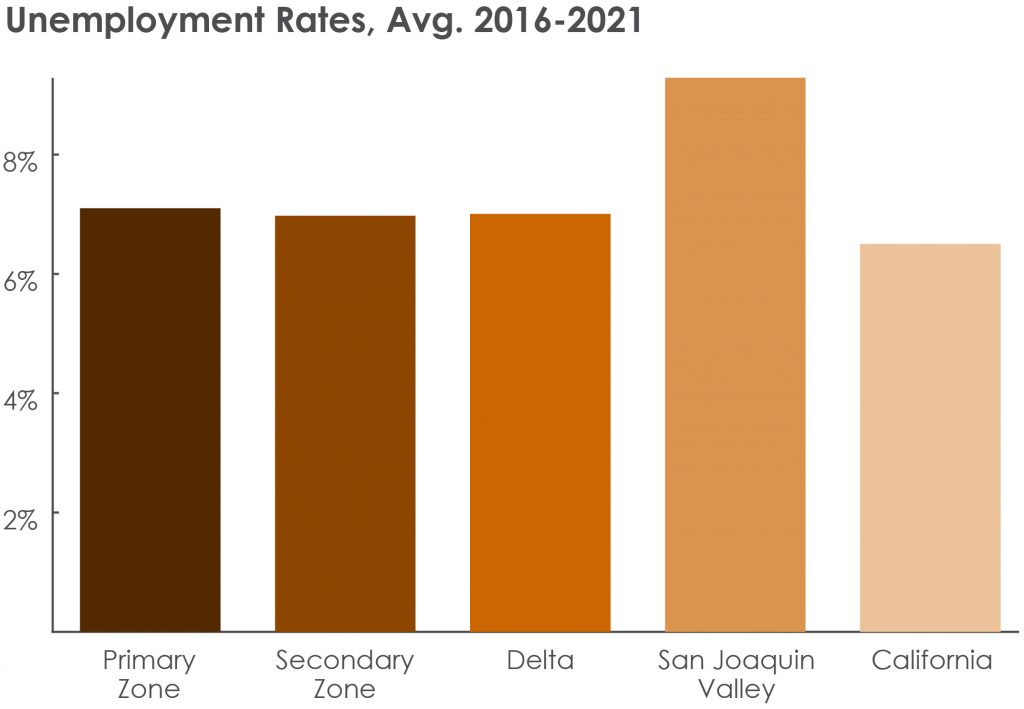
- Both median household and median individual incomes for the Delta increased over the previous period and were higher than the state’s as a whole.
- Land in agricultural production from 2017 to 2022 increased by over 10% over the 2011-2016 study period.
- Continuing trends from the previous period, higher value crops were being planted, with corn coverage dropping and almonds increasing.
- In 2022, 350,000 acres of land in the Primary Zone were in active agriculture: Top crops by total land cover were alfalfa, corn, grapes, clover/wildflowers, and winter wheat.
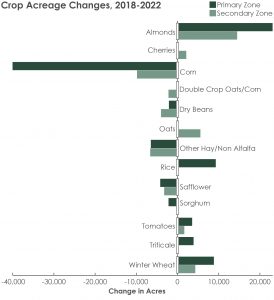
- Road pavement conditions, a measure of quality of infrastructure and public safety, worsened compared with the previous period by over 20%.
For more information about this report, email Virginia Gardiner.
Related
The Delta Residents Survey, published in 2023, explores Delta residents’ sense of place, quality of life, risks/resilience to climate change, and civic engagement. The survey was conducted by the Delta Stewardship Council with researchers from UC Davis, UC Berkeley, and Oregon State. Read the survey summary here, and explore the data here.

Articles Exploring Delta Data
By Holly Heyser Delta Protection Commission Rice acreage is growing rapidly in the Sacramento-San Joaquin Delta’s agricultural core. It nearly tripled in the Delta’s Primary Zone between 2018 and 2022, […]
June 30, 2025
WEST SACRAMENTO, Calif. (March 21, 2025) – Unemployment fell. Median income rose. Land in agricultural production increased. These improving socioeconomic indicators for the Sacramento-San Joaquin Delta are highlights of a […]
March 21, 2025
Pretty much the entire Sacramento-San Joaquin Delta is a floodplain, where the chances of flooding in any given year are as high as 1 in 10 in some areas[1]. But […]
October 21, 2024
What policies would Delta residents support for adapting to environmental changes in the region? Given nine choices in a recent survey of Delta residents, only one garnered majority support: increasing […]
August 22, 2024
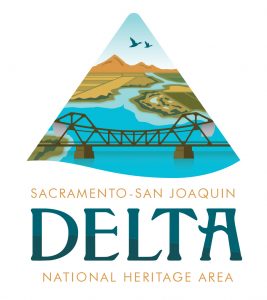
WEST SACRAMENTO, Calif. (Sept. 19, 2024) – The Delta Protection Commission appointed 12 members and 4 alternates Thursday to the Commission’s new National Heritage Area Advisory Committee.
The Committee will recommend policies, processes, and governance as the Commission implements the Sacramento-San Joaquin Delta National Heritage Area Management Plan. Committee members will also act as ambassadors to the diverse partners and communities in the NHA.
The appointees are:
- Mike Campbell, president of the Delta Leadership Foundation, board member of Friends of the 1883 Clarksburg Schoolhouse, served on NHA Management Plan Advisory Committee
- Colin Coffey, an elected member of the Board of Directors of the East Bay Regional Park District
- Lisa Craig, Mayor of Lodi, President of The Craig Group Partners, a Lodi-based preservation and planning consulting firm
- Dwayne Eubanks, President Antioch Historical Society from 2019 to 2023
- Carol Jensen, author, active in Delta historical societies, works in finance, accounting & information systems consulting, served on NHA Management Plan Advisory Committee
- Morris Lum, has served as president of the Sacramento Historical Society and board member of the Sacramento River Delta Historical Society and Sacramento History alliance, an elected director of Recreational Boaters of California, member of Delta Protection Advisory Committee, alum of the Delta Leadership Program (2022)
- Don Nottoli, former Sacramento County Supervisor, former chair of Delta Protection Commission
- Elizabeth Patterson, former mayor of Benicia, lead project manager for the State Lands Commission’s initiative leading to the adoption of the Delta Protection Act; was vice chair of NHA Management Plan Advisory Committee
- David Stuart, archeologist, Director of Sacramento Science Center (now MoSAC), Sacramento History Museum, and San Joaquin County Historical Museum, Sacramento River Delta Historical Society board member, served on NHA Management Plan Advisory Committee
- Stuart Walthall, chairman of non-profits including the Locke Foundation, chair of the Locke Management Association, professional musician
- Dan Whaley, chairman of Delta Legacy Communities, operator of the Willow Ballroom and Event Center, served on NHA Management Plan Advisory Committee
- Katie Wiley, owner/operator of K. Wiley Marketing Design, member of Delta Protection Advisory Committee, alumna of the Delta Leadership Program (2024)
The alternates are:
- Paulette Hennum, former Tribal Affairs Program Manager, California State Parks; has worked in museums as an officer, board member, program advisor, peer reviewer, collections care assessor and grant reviewer; served on NHA Management Plan Advisory Committee
- Douglas Hsia, secretary of Locke Foundation and materials broker for shoes and leather goods production, member of Delta Protection Advisory Committee, served on NHA Management Plan Advisory Committee, alum of the Delta Leadership Program (2022)
- Janet Lake, board member of Freeport Citizens Community Council, served on NHA Management Plan Advisory Committee
- Gia Moreno, secretary of Hood Community Council, member of Pear Fair Planning Committee, served on NHA Management Plan Advisory Committee
Ex officio (non-voting) members are:
- Amanda Blosser, a cultural resource specialist at the Diablo Range District of California State Parks, worked on the National Heritage Area interpretive plan for State Parks
- Chris Lim, Executive Director of the Contra Costa Resource Conservation District, an alum of Delta Leadership Program (2022)
Other entities that may be represented by ex officio members in the future may include the Contra Costa Resource Conservation District, the Delta Stewardship Council, the East Bay Regional Park District, the National Park Service, the Sacramento-San Joaquin Delta Conservancy, and the Suisun Resource Conservation District.
In addition to the above, two members of the Delta Protection Commission – Chair Diane Burgis of Contra Costa County and Commissioner Oscar Villegas of Yolo County – sit on the Committee. The group will be chaired by the Delta Protection Commission Executive Director Bruce Blodgett or his designee.
The Committee, which is governed by this charter (PDF), succeeds the NHA Management Plan Advisory Committee, whose work is done now that the Management Plan has been submitted to the Secretary of the Interior, via the National Park Service.
The Committee’s first meeting will be Oct. 31 in Oakley. The agenda for the meeting will be posted at least 10 days in advance.
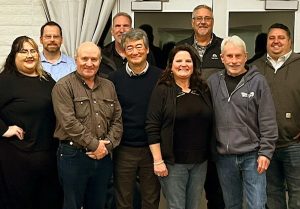
Gerry Goodie, shown here in the front row on the right side at his first DPAC meeting in February
WEST SACRAMENTO, Calif. (Sept. 19, 2024) – The Delta Protection Commission on Thursday named one seat on the Delta Protection Advisory Committee in honor of Gerry Goodie, who served on DPAC briefly this year before passing away.
The Gerry Goodie Memorial Seat is Delta General Public Seat 2, currently occupied by Goodie protege Katie Wiley, who was appointed to the committee in May.
DPAC Chair Anna Swenson spearheaded the action. “He was so active, a great communicator, and a valued member of the Delta public,” she said of Goodie.
Goodie was the co-owner, with his wife, of Wimpy’s Marina Restaurant & Bar in Walnut Grove, as well as a 2023 alum of the Delta Leadership Program, a joint program of the Delta Protection Commission and the Delta Leadership Foundation. He was appointed to DPAC in January, and passed away in late February.
DPAC provides recommendations to the Delta Protection Commission on diverse interests within the Delta, including the Delta’s ecosystem, water supply, socioeconomic sustainability, recreation, agriculture, flood control, environment, water resources, utility infrastructure, and other Delta issues.
DELTA PROTECTION COMMISSION
Diane Burgis, Chair (Contra Costa County Board of Supervisors)
2101 Stone Blvd., Suite 200, West Sacramento, CA 95691
(916) 375-4800 | delta.ca.gov
June 14, 2024
The Honorable John Garamendi
United States House of Representatives
2004 Rayburn House Office Building
Washington, DC 20515
Subject: Support for H.R. 7719, Abandoned and Derelict Vessel Removal Act of 2024
Dear Congressman Garamendi:
I write to express the Delta Protection Commission’s strong support for this legislation. The Commission has long advocated for removal of abandoned and derelict vessels (ADVs) from Delta waterways, and remediation of the environmental damage ADVs cause to the rivers and sloughs that are vital to irrigating farmland, supporting recreational and commercial fisheries, and providing enjoyment in all kinds of water recreation. ADVs pose real and significant threats to public safety and property from navigation hazards, and damage to docks, marinas, and levees.
The Delta Protection Commission is a California state agency charged with protecting and enhancing the unique values of the Sacramento-San Joaquin Delta, a resource of state and national importance that, largely owing to your tireless efforts, was recognized by Congress as California’s first and so far only National Heritage Area in 2019. The Commission provides a “forum for Delta residents to engage in decisions regarding actions to recognize and enhance the unique cultural, recreational, and agricultural resources of the Delta” [Public Resources Code (PRC) § 29703.5(a)]. As such it includes representatives from city and county governments in each of the five main Delta counties, Delta reclamation districts, four state agencies and one non-voting, ex-officio member each from the Senate and Assembly.
As a primary function, the Commission maintains and oversees implementation of a comprehensive long-term Land Use and Resource Management Plan (LURMP) that includes goals and policies aimed at protecting, maintaining, enhancing, and restoring the overall quality of the Delta environment. Public Resources Code applicable to ADVs requires that the LURMP policies must “preserve and protect open-space and outdoor recreational opportunities,” “preserve and protect opportunities for controlled public access and use of public lands and waterways consistent with protection of natural resources and private property interests,” and “preserve, protect and maintain navigation” [PRC§29760 (b)(9-11)].
The Commission has worked with local law enforcement marine patrol units, the U.S. Coast Guard (USCG), the State Parks’ Division of Boating and Waterways (Boating and Waterways), State Lands Commission, Recreational Boaters of California, CalRecycle, the Bay Conservation and Development Commission, and other stakeholders to promote and facilitate abandoned vessel removal. The Commission’s collaborative project with the Department of Fish and Wildlife’s Office of Spill Prevention and Response to identify and map ADVs within the Delta in 2019 led to state legislation that provides limited funding for removal of commercial ADVs by the State Lands Commission. Additional funding by Boating and Waterways supports removal of recreational vehicles. The USCG can only remove hazards to navigation. Thus it typically falls to local law enforcement marine units with limited resources to remove non-commercial ADVs in their counties. However, the scope of all these efforts is significantly constrained, largely due to funding, and limitations on where and how federal agencies such as the USCG and the U.S. Army Corps of Engineers (Corps) could assist.
The Abandoned and Derelict Vessel Removal Act, H.R. 7719, would bring much needed cohesion to this patchwork management by providing additional funding and organization. Significantly, the bill would authorize the Corps to remove any abandoned vehicles regardless whether they impede navigation, and to create and maintain a national inventory of ADVs. Such an inventory could help identify more regional-based solutions and coordination in areas such as the Delta where there is overlapping jurisdiction among responsible agencies.
Thank you for your commitment to finding solutions to this complex public safety issue of concern to Delta farmers, residents, and business owners, and the many visitors who come to the Delta.
Sincerely,
Bruce Blodgett
Executive Director
CC: The Honorable Laphonza Butler, U.S. Senator
The Honorable Alex Padilla, U.S. Senator
The Honorable Mark DeSaulnier, U.S. Representative
The Honorable Josh Harder, U.S. Representative
The Honorable Doris Matsui, U.S. Representative
The Honorable Mike Thompson, U.S. Representative

RIO VISTA, Calif. (May 16, 2024) – The Delta Protection Commission appointed two new members and re-appointed four incumbents to the Delta Protection Advisory Committee (DPAC) on Thursday.
The new appointees are Emily Pappalardo, Delta Business Seat 2 (on the left in the photo), and Katherine Wiley, Delta General Public Seat 2 (on the right in the photo). Both are graduates of the Delta Leadership Program, a project of the Delta Protection Commission and Delta Leadership Foundation – Pappalardo in 2016, and Wiley this year.
Pappalardo is a principal engineer and partner in DCC Engineering Co. Inc. in Walnut Grove, which serves several reclamation districts in the North Delta and provides permitting, planning, and architectural services to the Delta community. She has an interest in Steamboat Resort, a private boat club and residence on the north end of Steamboat Slough, where she was raised. She is also incoming president of the Rotary Club of Walnut Grove, a board member of the Delta Leadership Foundation, an associate member of the Central Valley Flood Control Association, and a volunteer on the Pear Fair Committee.
Wiley owns Wiley Marketing & Design, which has a substantial client base in Rio Vista, Walnut Grove and Locke. She and her husband own a houseboat that’s been berthed in Walnut Grove for the past eight years, and both are avid boaters who spend most of their free time on the river.
The incumbents who were reappointed Thursday are:
- Craig Watanabe, Delta Agriculture (Seat 2)
- Douglas Hsia, Delta Cultural Preservation
- Morris Lum, Delta Recreation (Seat 2)
- Erin Chappell, State Agency (Seat 2)
All six will serve three -year terms.
DPAC provides recommendations to the Delta Protection Commission on diverse interests within the Delta, including the Delta’s socioeconomic sustainability, recreation, agriculture, flood control, environment, utility infrastructure, and other Delta issues. The Committee was created by the Delta Protection Act, Public Resources Code Section 29753(a).
 WEST SACRAMENTO, Calif. (June 24, 2025) – The Delta Protection Commission invites public comment through Sept. 8, 2025, on the preliminary report of its study of Delta farmland conversions for water supply, flood control, and habitat projects.
WEST SACRAMENTO, Calif. (June 24, 2025) – The Delta Protection Commission invites public comment through Sept. 8, 2025, on the preliminary report of its study of Delta farmland conversions for water supply, flood control, and habitat projects.

 WEST SACRAMENTO, Calif. (June 17, 2025) – The Delta Protection Commission has scheduled public workshops on July 15 and 17 to hear about the impacts of farmland conversion for habitat and flood control projects on farmers, reclamation districts, and other affected parties.
WEST SACRAMENTO, Calif. (June 17, 2025) – The Delta Protection Commission has scheduled public workshops on July 15 and 17 to hear about the impacts of farmland conversion for habitat and flood control projects on farmers, reclamation districts, and other affected parties.






